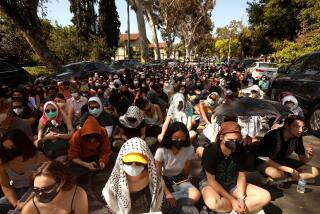Free speech -- within limits
This newspaper ardently supports the right to free speech, even when that speech is controversial, hateful or ignorant. But no right is absolute, and Patricia McAllister, a substitute teacher with the Los Angeles Unified School District, crossed a line with her anti-Semitic comment at Occupy Los Angeles.
“The Zionist Jews who are running these big banks and the Federal Reserve … need to be run out of this country,” she said in the taped interview with Reason TVthat then went viral on YouTube. On Tuesday, Supt. John Deasy fired her.
Good for him. As obnoxious as McAllister’s remarks were, this probably wasn’t all that easy a decision for Deasy to make. McAllister wasn’t at work when she spoke. Though she identified herself as a school district employee, she was careful to note that she was not speaking as a representative of L.A. Unified. And Deasy knows as well as anyone that courts have historically — and correctly — protected teachers’ free-speech rights.
But there are limits. As a teacher, McAllister works with a captive audience of vulnerable children. Her comments certainly raise questions about her ability to treat them all equally and fairly. What’s more, even if she’s been the soul of discretion on the job, as well as kind and evenhanded with all her students, by making herself a public symbol of intolerance, McAllister no longer can serve effectively as a teacher.
For one thing, Jewish students likely would feel intimidated in her classes, no matter how nicely she treated them; their parents and many others might storm the principals’ offices demanding her removal. Other students and parents might rally to her cause, or, alternately, they too might feel threatened by her bigoted positions. She would be a disruptive element on campus, and her future effectiveness as a teacher would almost certainly be compromised. (After she was fired, McAllister expanded on her views in an interview with Fox TV: “The word Jew is similar to communism today … Jews have been run out of 109 countries through history and we need to run them out of this one.”)
As execrable as her comments were, it might be a different matter if McAllister were, say, a Department of Motor Vehicles clerk. There, she would be dealing with adults who could hold their own, and would have little direct authority over them. It also might be different if she had expressed a controversial opinion that was not an inflammatory attack on a particular ethnic or religious group.
We’re reluctant to restrict anyone’s ability to express even the most loathsome views openly and publicly. But when a teacher trumpets hateful opinions that could intimidate the impressionable young people she’s supposed to be serving, that’s not just free speech — it’s a performance issue. In speaking out so intemperately, McAllister’s ability to do her job was fatally compromised.
More to Read
A cure for the common opinion
Get thought-provoking perspectives with our weekly newsletter.
You may occasionally receive promotional content from the Los Angeles Times.






